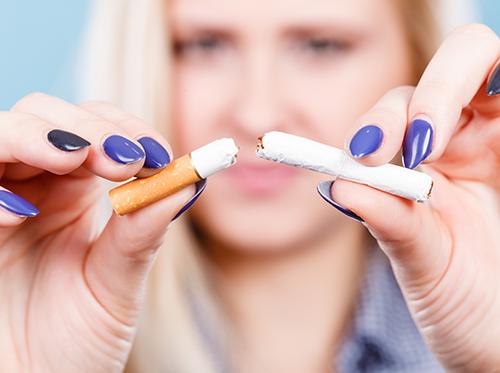May Marks National Physical Fitness and Sports Month!
- posted: May 01, 2024
The merry month of May also happens to be National Fitness and Sports Month, so take advantage of the warmer days to get outside and exercise! Bringing a friend, family Read More
Headaches: The Dental Connection
- posted: Apr. 24, 2024
Many people suffer through headaches for years without getting to the root cause of their problem. If you find yourself constantly popping painkillers to get through the day, it might Read More
Make Every Day Earth Day
- posted: Apr. 17, 2024
Earth Day began in 1970 as an event to raise awareness of our environment. What began as a single day in April is now recognized around the world to bring Read More
Love your new smile? Tell us about it!
- posted: Apr. 10, 2024
At James P. Watts, DMD, we have been creating beautiful smiles for years. Whether you have visited the doctor and our team for a week or for your entire life, Read More
Oral Cancer Awareness Month
- posted: Apr. 03, 2024
Happy Oral Cancer Awareness Month! We know oral cancer can be kind of a scary topic, but it’s worth using this opportunity to learn about the disease and spread knowledge Read More
Dental Fear in Children: Brought on by parents?
- posted: Mar. 27, 2024
A study conducted in Washington State in 2004 and another conducted in Madrid, Spain in 2012 both reported findings that support a direct relationship between parents’ dental fear and their Read More
What NOT to Eat after Wisdom Teeth Extraction
- posted: Mar. 20, 2024
Now that you’re having your wisdom teeth removed at our Mystic, Connecticut office, you’re probably looking forward to spending a few days on the couch with a cool dish of Read More
St. Patrick's Day: Celtic pride, green shamrocks, and lucky charms!
- posted: Mar. 13, 2024
“St. Patrick's Day is an enchanted time -- a day to begin transforming winter's dreams into summer's magic.” Adrienne Cook Lucky green shamrocks, leprechauns, and pots of gold – it must Read More
Good Nutrition Leads to Healthy Mouths
- posted: Mar. 06, 2024
At James P. Watts, DMD, we know the most common oral health diseases are tooth decay and periodontal disease (or gum disease), and both are among the easiest to prevent. Read More
HPV and Oral Cancer
- posted: Feb. 28, 2024
Human papillomavirus, or HPV, is best known as a sexually transmitted infection. In the United States, HPV is the most common sexually transmitted disease, with 79 million Americans currently infected, Read More
Keep It Cheesy for a Long-Lasting Smile
- posted: Feb. 21, 2024
You’ve heard people tell you to say “cheese” when you’re having your picture taken, probably more times than you can count. There is another reason you should be saying “cheese” Read More
The Origins of Valentine's Day
- posted: Feb. 14, 2024
When we think of Valentine’s Day, we think of cards, flowers, and chocolates. We think of girlfriends celebrating being single together and couples celebrating their relationship. We think of all Read More
Periodontal Health during Pregnancy
- posted: Feb. 07, 2024
Congratulations! Your pregnancy is a time of joy and excitement—and a time to take special care of yourself. You’ve discovered that pregnancy brings many physical changes, but it may still Read More
Are My Child’s Baby Teeth on Schedule?
- posted: Jan. 31, 2024
Your darling three-month old is crying and fussy—can she be teething already? Or, your happy baby boy has just celebrated his first birthday—with only one tooth in that beautiful, gummy Read More
Is Charcoal Teeth Whitening Safe?
- posted: Jan. 24, 2024
Health and beauty trends surface on the web every day, and it can be difficult to tell which ones are worth your time, or even safe, for that matter. Perhaps Read More
Ways to Prevent Oral Cancer
- posted: Jan. 17, 2024
According to the Oral Cancer Foundation, this form of cancer kills roughly one person an hour, every 24 hours. This means that nearly 10,000 people will die this year from Read More
















